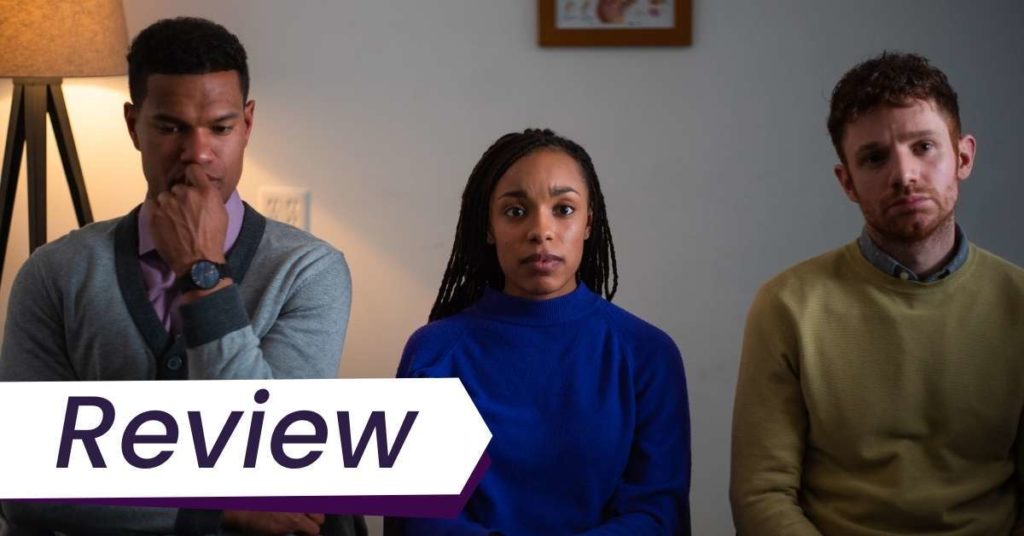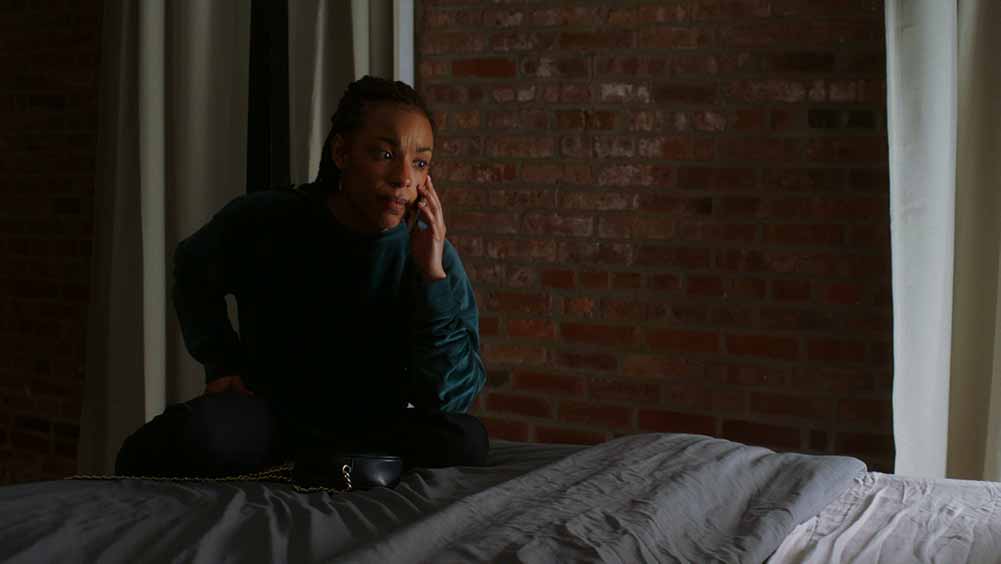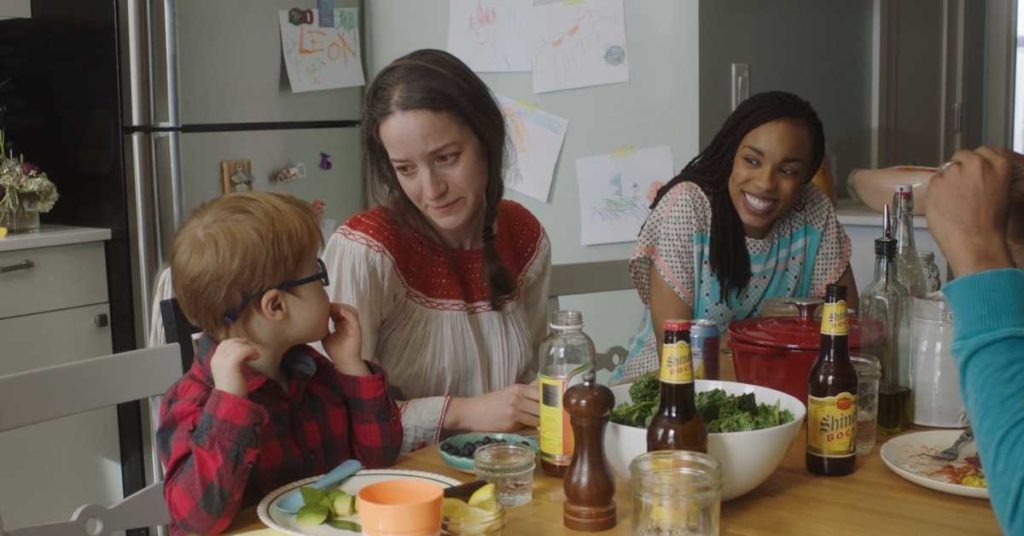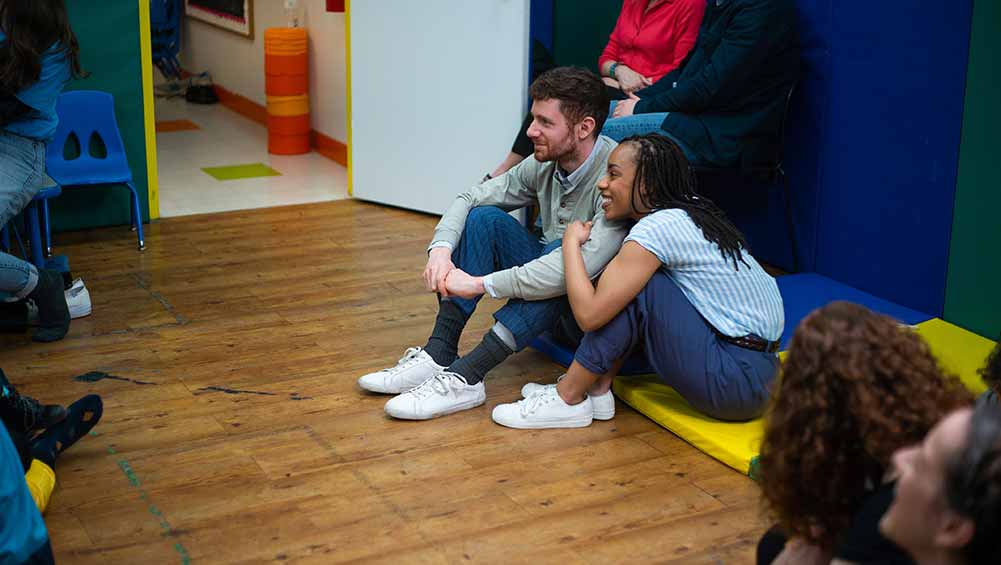Jasmine Batchelor gives one of the best performances of the year in Jeremy Hersh’s The Surrogate, a smart and sensitive drama about a pregnancy surrogate who finds out the foetus will be born with Down Syndrome.
The Surrogate is now in UK cinemas. For more information and tickets, head to: https://studiosohodistribution.com/buy-tickets/. The film is already on VOD in Canada and the US, and streaming on Starz in the US.

Discover one film you didn’t know you needed:
Not in the zeitgeist. Not pushed by streamers.
But still easy to find — and worth sitting with.
And a guide to help you do just that.
Jess (Jasmine Batchelor), the lead character of The Surrogate, seems totally in control of her life. In the opening scene, she matter-of-factly (and not unkindly) explains to her former boyfriend that she’d love to stay friends and maybe even hook up from time to time, but monogamy isn’t in the cards for her right now. Here is a woman who knows what she wants and isn’t afraid to go after it — or at least, that’s the image she projects.
Things are about to change drastically for Jess, sending her into a tailspin that forces her to confront what she really wants out of life. She’s decided to be a pregnancy surrogate for her best friend, Josh (Chris Perfetti), and his husband, Aaron (Sullivan Jones), and she’s more than confident about the decision. Jess is a do-gooder: she works as a web designer for a nonprofit that provides classes for incarcerated women. Helping others is integral to her sense of self. She’s not accepting money in exchange for surrogacy (it’s illegal to do so in New York, anyway); rather, she’s doing it because the idea of helping two of her closest friends have a child makes her happy. When the pregnancy test comes back positive, she’s just as elated as they are.

After a series of scenes in which Jess, Josh, and Aaron celebrate and prepare for the baby, director Jeremy Hersh cuts suddenly to a more sombre scene. In a three shot, we watch the trio receive the news that the foetus, just ten-weeks on at this point, will likely be born with Down Syndrome. From the shocked look on their faces, we know that Jess, Josh, and Aaron weren’t remotely prepared for this situation; navigating whether or not to keep the baby will be a complicated process. Suddenly, the harmonious dynamic between the trio is disrupted, and the film becomes a complex exploration of so many thorny issues, among them bodily autonomy, disability rights, and racial and class privilege
The Surrogate asks a question that I, as a viewer, had never thought to ask before: in a surrogacy situation, who decides whether or not to terminate the pregnancy? My default answer is always that it’s a woman’s choice what to do with her body, and that’s true, even here — nobody can or should force Jess to get an abortion against her will. But as a surrogate, should Jess have a say on whether or not to have the child, if she’s not the one who’s eventually going to raise it? At first, Jess is very happy to defer to Josh and Aaron completely. But the more she researches Down Syndrome, and the more she lives with the foetus in her body, the harder it is for her to extricate her own feelings and opinions from the process.
Immediately after receiving the news, Jess appoints herself as the mediator between the couple — Josh and Aaron — and the rest of the world, as they grieve over the able-bodied baby they had imagined in their heads. With her attentive listening face, warm body language, and patient voice, Jasmine Batchelor portrays Jess as a perennial problem solver. When Josh struggles to tell friends and family about the new development in the pregnancy, because he’s on the verge of tears, Jess swiftly takes his phone, goes into the other room, and shuts the door so she can do it for him. Afterwards, she returns home and slumps down on her sofa, exhausted, with nobody there to comfort her in turn. She became a surrogate in the first place as a way of helping, and now that things haven’t gone as planned, she’s intent on staying the helper, placing her own emotions second.

Jess is also the one who takes charge when it comes to researching parenting a child with Down Syndrome: she reads books that she recommends to Josh and Aaron, and arranges for the trio to visit a daycare for children with Downs. The film deals intelligently and sensitivity with each character’s different opinions on, and approaches to, parenting a child with Down Syndrome. Josh and Aaron start the research process skeptically and full of biased preconceptions, especially as Josh grew up knowing a boy with Downs, whom he found distant and difficult to talk to, and who died young. He assumes that his one experience with someone with Downs is representative of all people with Downs. Jess is more open-minded in part because she won’t have to deal as directly with the consequences of the choice that’s ultimately made. If they keep the child, she won’t be the one raising it.
The Surrogate does a good job of communicating how the hardest parts of parenting a child with Down Syndrome are navigating an ableist society, rather than dealing with the child themselves. Jess befriends Bridget (Brooke Bloom), a mother at the daycare with a young child, Leon, who has Downs. Bridget is perennially distracted and always has deep, dark circles under her eyes. She’s clearly exhausted, but when she talks about the difficulty she’s faced parenting Leon, she talks about inhospitable schools, bureaucratic problems, and how expensive it is to send him to a school that understands and makes room for him. Jess finds Leon to be a sweet, curious, affectionate child, but Josh and Aaron are less eager to engage. Their reluctance to challenge their own biases is frustrating, but it’s hard to blame them for their wariness after hearing about how our ableist society would add such challenges to their lives, and their child’s life, both financially and socially.

Meanwhile, Jess becomes more and more eager to have the child; even though we stay firmly within Jess’s perspective, Hersh still creates empathy for Josh and Aaron’s opposing position. Jess is in every scene, so we don’t see any of Josh and Aaron’s decision-making behind closed doors. Hersh gives us enough information so we can understand why the couple is leaning toward aborting the foetus, but he keeps us aligned with Jess as she becomes enthusiastic about keeping the child, a minority opinion, because as Josh states in the film, the majority of people in this situation decide on an abortion.
In its final act, Hersh’s film becomes about the difference between making a political choice versus a personal one, and how that becomes especially hard in a world as unequal as the one we live in. As a political person, and a Black woman (albeit a financially privileged one) who has experienced oppression herself, Jess is eager to do good in the world. She becomes invested in disability rights activism after finding out how many systemic barriers people with Down Syndrome face. She decides that having the child is the right thing to do, and worries that aborting the foetus would be contributing to the history of eugenics regarding Down Syndrome. She even considers raising the child herself if Josh and Aaron don’t want it.

Especially over the past year and a half, as a global pandemic and movements for racial justice have exposed just how selfish people can be, and how unequal the world is, it’s easy to lose yourself worrying about how to make things better, when the problem is so much bigger than just one person. As a person used to prioritising the needs of others above her own, Jess becomes consumed by the social necessity of having this child, without really considering if she’s ready for any child, disabled or not — or that there are other ways to campaign for disability rights.
Batchelor’s terrific performance, one of the best of the year, helps make The Surrogate just as much a moving character drama as it is a thoughtful conversation starter. We digest the film’s many complex questions through the eyes of Jess, who is trying her best but tripping up along the way as she struggles through a personal crisis. Batchelor impressively conveys a woman with strong, passionately held values and a hard shell when it comes to showing her own emotions. There’s a heartbreaking scene near the end of the film when she berates Josh and Aaron: Batchelor’s tense, quivering face and voice convey how close she is to breaking down. Still, she doesn’t cry until she’s out of sight, keeping up her mask in public lest she reveal the extent of her vulnerability.
Jess’s ultimate arc is realising that she doesn’t have all the answers to the world’s problems, or her own, and that’s OK. Similarly, Hersh leaves the viewer with many questions to ponder, but no answers. There is no right or wrong answer, only informed and empathetic choices.
The Surrogate is now in UK cinemas. For more information and tickets, head to: https://studiosohodistribution.com/buy-tickets/. The film is already on VOD in Canada and the US, and streaming on Starz in the US.
You could be missing out on opportunities to watch great films like Jeremy Hersh’s The Surrogate at virtual cinemas, VOD, and festivals.
Subscribe to the Seventh Row newsletter to stay in the know.
Subscribers to our newsletter get an email every Friday which details great new streaming options in Canada, the US, and the UK.
Click here to subscribe to the Seventh Row newsletter.

Discover how the best filmmakers working today approach filmmaking
A practical guide to moviemaking, as told by the best filmmakers working today.

